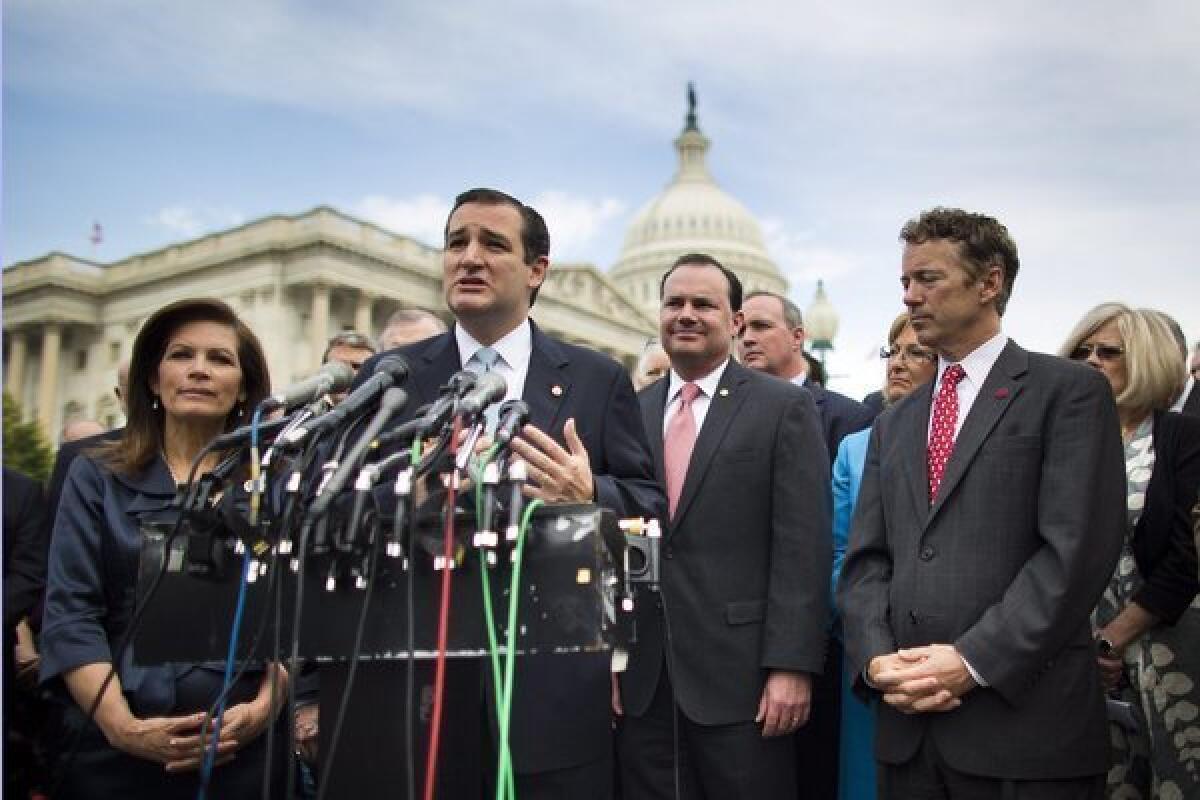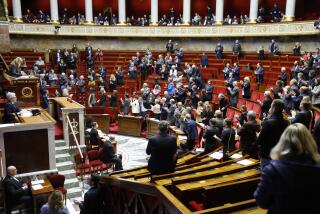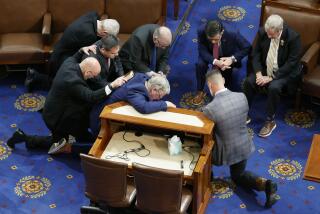Less conservative America poses challenge to Republicans

WASHINGTON – Although the controversies dominating political headlines eventually might undermine President Obama’s standing with voters, a longer-term reality – a declining number of people who identify themselves as conservatives – could cause much more trouble for his Republican opponents.
Republicans won big in the 2010 midterm election, taking control of the House and numerous state legislatures. That victory corresponded with a significant increase in the percentage of Americans calling themselves conservative, particularly on economic issues. Since then, however, the percentage has steadily declined, according to an annual “values and beliefs” survey conducted by Gallup.
The latest version shows a further drop, with 41% of Americans calling themselves economic conservatives, down from just over 50% at the 2010 peak. On social issues, the share identifying as conservatives has dropped slightly and is now just more than 1 in 3.
On social issues, the big gain has come among those who call themselves liberals, whose ranks have increased from 22% of adults in 2010 to 30% now. On economic issues, gains have mostly come among those calling themselves moderates, with the percentage of liberals holding relatively steady.
For Republicans, the trend poses a challenge. The party depends heavily on self-identified conservatives for votes, even as their ranks have become scarcer.
Just more than a quarter of American adults (26%) now identify as conservatives on both economic and social issues. But that relatively small group makes up almost two-thirds (63%) of those who identify themselves as Republicans or independents who say they lean Republican, the Gallup data show.
Conservatives can take heart that they still outnumber self-identified liberals – 1 in 8 adults (13%) called themselves liberal on both economic and social questions. But Democrats don’t depend on liberals as exclusively as Republicans depend on conservatives. Consistent liberals make up only a bit more than a quarter of those who identify themselves as Democrats or independents who lean toward the Democrats.
None of those numbers necessarily forecasts an election result. Republicans won big in 2010 in part because more Americans considered themselves conservative, but also because more of them showed up to vote. That’s where the current Washington controversies over the IRS, the killing of the U.S. ambassador to Libya last year and other issues could have an effect. Republican strategists hope those issues will arouse their voters and spur them to the polls while dispiriting Democrats.
Over the longer term, however, Republicans clearly face a problem that will require either changing voters’ minds or shifting their party’s identity if it is to keep winning. Changing voters’ minds can happen – after all, the percentage of Americans who call themselves conservative did go up after Barack Obama’s first election as president, so presumably, it could go up again. But that would require swimming against a fairly strong tide, which shows up clearly in an analysis of different age groups that Gallup did for the Los Angeles Times.
Among adults 65 and older, those identifying themselves as conservative hit 43% on social issues and 47% on economic ones.
But among those younger than 30, the corresponding figures were 31% and 32%.
Among adults 18 to 29, those who call themselves liberals on social issues form a larger group (41%) than either social conservatives (31%) or social moderates (37%).
And among those in the next older age group, those in their 30s and 40s, liberals, moderates and conservatives on social issues make up about equal shares. The pattern is not quite as sharp on economic issues, but there too the results show a noticeable break around age 50 in the ideological labels people choose, with those who are younger significantly more likely to call themselves liberal.
On social issues, although not on economic ones, education levels matter a lot. Those with college degrees or higher call themselves liberal on social issues at a much higher rate than those without. In recent elections, Democrats have gained heavily among college-educated voters, and the percentage of Americans who go to college and earn a degree has been on a long-term increase.
These results should mostly not be affected by the well-publicized problems that befell Gallup during the last election, in which its results skewed significantly toward Republican candidate Mitt Romney. Some of those problems had to do with how Gallup forecast who would show up to vote. Many of those problems, which Gallup has tried to fix, would not affect these numbers, which come from a survey of all American adults, not just likely voters. The survey, conducted May 2-7, interviewed 1,535 adults, age 18 and older. The margin of error is plus or minus 3 percentage points.
david.lauter@latimes.com
On Twitter @DavidLauter
More to Read
Get the L.A. Times Politics newsletter
Deeply reported insights into legislation, politics and policy from Sacramento, Washington and beyond. In your inbox three times per week.
You may occasionally receive promotional content from the Los Angeles Times.







